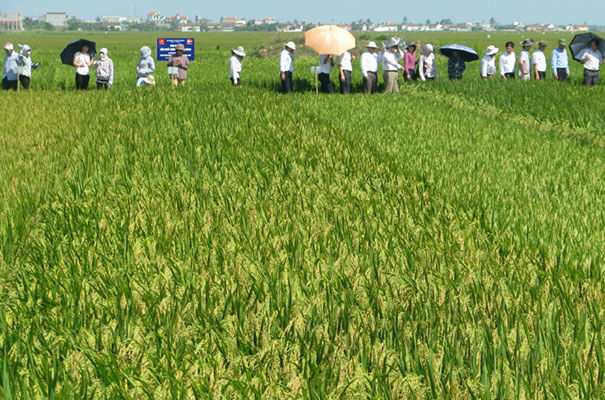The international project aims to maintain crop productivity in the face of climate change, disease resistance and salt tolerance – and to potentially develop higher-value rice varieties for the global market.
As part of the Newton Fund, TGAC has been awarded over £50,000 by The British Council to develop the bioinformatics capabilities. These will inform next-generation rice genomics in Vietnam to aid precision breeding for improvement of crops by exploring 48 local rice varieties.
As the second-largest global rice exporter, Vietnam relies on its most important agricultural commodity. A dramatic increase in rice production has taken place since the 1980s, due to the expansion of arable land and a shift in the crop’s varieties from producing a single annual yield to two-three yields per year.
With an impressive 3.3 per cent annual yield increase from 1987, Vietnamese rice production has benefited from the uptake of new rice varieties and improvements in genetics applied to advance crop breeding. However, there is an increasing threat to this vital crop from factors associated with climate change such as emerging pathogens and rising sea levels, where Vietnam's major rice growing areas are predominantly coastal, as well as the environmental pressures of rapid urban development.
Developing the bioinformatics capacity in Vietnam will allow research Institutes to benefit from advancements in next generation genomics, applying their computational skills to rice breeding to help maintain productivity in the face of changing climates, and potentially develop new higher value rice varieties for the global market.
In collaboration with the Agriculture Genetics Institute (AGI) in Hanoi, TGAC is working to characterize the genetic diversity of traditional rice varieties from Vietnam, aiming to develop genomic markers associated with traits of interest such as disease resistance and salt tolerance.
With the initial research phase of this project exploring the genetic diversity of 36 local varieties, this project will provide funding for a further 48 varieties to be analyzed – with the aim to increase this number to 600 in the future. The generation of such large genomic datasets requires expertise in bioinformatics in order to analyze the data and develop molecular tools to aid precision breeding for improving rice.
The international collaboration between TGAC and AGI will extend out to a wider group of researchers in Vietnam through training workshops to build bioinformatics capacity, using rice as a model.
The programme involves the exchange of scientists from Vietnam to gain expertise in bioinformatics analysis, and from UK to learn about the field phenotyping activities in Vietnam. Scientists from TGAC, AGI and other participating Institutes will host ‘Train the Trainer' workshops in Norwich to train Vietnamese researchers in bioinformatics and genomic analysis to equip them with the skills to sustain training for researchers in Vietnam for the future.
To make the data accessible, TGAC will set up a public database to host the variant data within the context of the latest genome assemblies and annotation. Project lead, Sarah Ayling, crop genomics and diversity group leader at TGAC, said: “The Institutional Links funding provides an opportunity for us to train Vietnamese scientists in bioinformatics, and equip them with the skills to train others to help advance their understanding of next generation genomics.
“These ‘Train the Trainer’ activities will enable the flow of knowledge to other researchers in the region, providing more scientists with the skill-set required to make use of genomic data for rice breeding and improve the crop yield for current and future generations in Vietnam.
“Our partnership will enable TGAC and the UK to provide guidance on best practices and, in collaboration with our Vietnamese colleagues, lead the development of innovative ways to share data and enhance the training and up-skilling of scientists in the areas of bioinformatics and genomics globally.”
Source: Business Weekly | 17 August 2015














